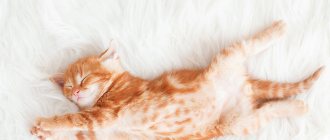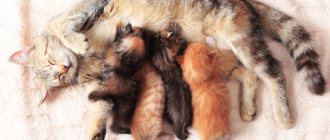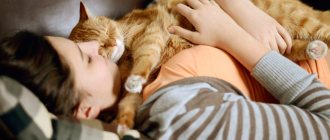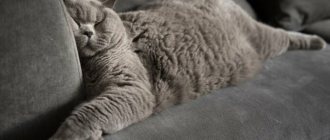How long does a cat sleep at 2 months?
By nature, the cat is a big sleepyhead. An adult cat can sleep up to 18 hours a day. What then about the little one, who only recently got into the house of new owners?
The most common age when kittens are given to a new family is 2 months. During this period, the tailed animal is actively developing, gaining weight, and spending a lot of energy. All these features affect his daily routine.
A normal, healthy kitten needs to sleep, eat, and play. Up to 2 months, this process is controlled by the mother cat. But from the moment of moving, this responsibility falls on the shoulders of the owner.
However, the mode may be different. It all depends on temperament, breed and habits. But even in this case, the cub must sleep at least 18 hours.
Most of the day is spent sleeping and feeding. At 2 months, the baby eats up to 5-6 times a day , after which, as a rule, he falls asleep for 2-3 hours. Entertainment and other active pastimes take about 4 hours.
In fact, at 2 months the baby wakes up only because of the feeling of hunger. If the animal is full, then it falls asleep.
What to do if your pet sleeps too much
If long sleep does not fit into your pet’s daily routine, but he suddenly begins to rest for a long time, you should be wary and also take a closer look at his health. In addition to drowsiness, the disease is indicated by the presence of the following symptoms:
- increased water consumption or refusal of it;
- lack of appetite;
- lack of response to external stimuli;
- diarrhea;
- vomit;
- false urge to urinate.
The presence of at least one of the listed symptoms indicates the need to visit a specialist. If these symptoms are not present, it may be due to the weather: cats, like people, can be weather dependent and feel sleepy on certain days.
Many people know that any cat spends most of its life sleeping. Scientists have calculated how many hours cats sleep per day. On average, our little brothers are willing to spend from 16 to 20 hours a day on their favorite activity, which is almost 80% of the time.
Moreover, there are no gender differences in this addiction - cats sleep as much as cats. Only possums and bats can compete with them in their passion for prolonged passive rest.
The reason for this behavior is explained by animal physiology. Any representatives of the cat family are predators by nature, although due to evolutionary changes and domestication, many of them have lost the behavioral traits characteristic of predators, they have retained the desire to accumulate strength. Like any predator, a cat is active while it is hungry, and passive when it feels full.
They show maximum activity during hunting hours - this is the twilight period at sunset and dawn. In a short time, they expend a huge amount of energy in order to catch up, grab and kill their prey. The cats spend the rest of their time recuperating and preparing for the next run.
One of the reasons why cats sleep for several hours during the day is simple boredom. These very smart and inquisitive animals need a “change of scenery” and new experiences. Living in a house where the environment does not change so often, animals quickly become bored. And the best way to “escape reality” is to get a good night’s sleep.
What to do if your kitten won't let you sleep at night?
It happens that when the new owner falls asleep and wants to sleep, his furry friend makes noisy games. This can naturally get in the way. How to deal with the problem?
- For proper rest, it is necessary to “exhaust” the silence breaker. Try playing with the cat for 20-30 minutes . This will ensure both you and him a healthy sleep.
- After wild games, it’s not bad to feed your four-legged friend. A hungry cat will never fall asleep and will try to do everything to keep you awake.
- If you work or for some other reason are absent all daylight hours, then it is completely normal that when your cat sees you, the desire to communicate appears. Therefore, pay attention to your pet, he is bored. You can pet, scratch and talk to him so that he feels your care and calms down.
If all of the above does not help or does not apply specifically to your case, then be sure to pay attention to the health of the animal. Perhaps this is how your pet is trying to tell you that he has some problems.
We hope our article was useful to you!
Source
How much should a kitten normally sleep at 3 weeks, 1-3 months?
A newly born kitten spends almost all of its time sleeping - up to 23 hours a day, only occasionally stopping to have lunch. As the baby grows, his periods of wakefulness increase.
At 3 weeks, kittens begin to actively explore the world around them. They don't see very well yet and are unsteady on their feet, so they still need a lot of rest. Babies sleep and recuperate for up to 16 hours a day.
Month-old kittens are actively exploring the world. They train their motor skills with all their might, playing with their brothers and sisters in hunting, chasing, and sometimes even starting real fights. All this takes a lot of energy, so a kitten at the age of 1 month sleeps a lot - 18-20 hours a day.
The need for such a long rest remains in the animal until adolescence. It is customary to give kittens to a new home long before reaching it - at 2-3 months, so new owners should not be surprised at the unusual sleepiness of the pet. The baby will go to bed 6-9 times a day, and this is absolutely normal! The exception is when the breeder deliberately taught a small cat to sleep at night, but this happens quite rarely. Much more often things are exactly the opposite.
How long do cats sleep?
Cats sleep 2-2.5 times longer than people; on average, it takes them from 14 to 22 hours for this serene activity. Their sleep is not continuous: the animal quickly falls asleep, wakes up, does its business and again plunges into the arms of Morpheus.
Why do cats sleep so much and what determines the duration of their sleep?
To answer this question, you need to turn to the physiology of pets. In the wild, predator cats hunt to get food - they cannot afford to sleep as much as a cat living in the house sleeps.
Pets are deprived of the need to get their own food - they spend all their free time sleeping. In addition, only in a state of deep sleep do cats fully rest.
Several factors influence the length of a cat's sleep:
- Pet's age. Kittens and older cats sleep much longer.
- Cat breed. The Scots and British can go to bed as soon as they eat. The Abyssinian cat and the Ocicat have an active temperament from a young age, so their sleep duration is less.
- Health status and stress are two other factors that affect sleep duration. Sick animals and stressed cats sleep less. Their sleep is more sensitive.
- The situation in the house and the environment in which the cat is located. Restless sleep may be a consequence of the cat being scared, uncomfortable, or someone in the household bothering her greatly.
If your pet is healthy, well-fed, but sleeps less than 12 hours a day and his sleep is intermittent and restless, try to find and eliminate the cause of his discomfort. You may have to build him a secluded sleeping place or simply give him more attention and affection.
How many hours should a kitten sleep?
We have already mentioned that kittens sleep longer than adults. Newborn babies can sleep for almost days, waking up only to eat.
Grown-up kittens at the age of 1 month sleep a little less - 21-22 hours. This is considered normal, because adequate sleep is necessary for the growth and development of the baby. Therefore, it is so important to create a cozy, secluded place for the cat and kittens in order to protect the kittens’ and mother’s sleep from unnecessary intrusive attention. By the way, while the kitten is with its mother and sucks milk, its daily schedule is determined by the mother cat.
Grown-up 2-month-old kittens sleep 18-20 hours a day. This is a time of active growing up. Babies begin to crawl around their mother, explore the world and play with their brothers and sisters. After another couple of months, kittens learn to run and jump - they like these activities, they stay awake for these active games.
Mister Cat explains why cats sleep so much
The average sleep norm for a cat is 2 and a half times higher than that of a human.
This high duration is due to the following reasons: Age. Month-old kittens and elderly pets sleep more than young and healthy individuals. Breed. Scottish and British cats may fall asleep immediately after eating. More active, for example, Abyssinians, in physical activity. Therefore, they will prefer games or contact with their owners to sleep. Condition of the body. If your cat's routine has changed - she begins to sleep a lot or, conversely, stays awake more - this may indicate health problems. It is better not to delay a visit to the veterinarian for examination and diagnosis. Accommodations. A pet may not get enough sleep if it is bothered by its neighbors
It is important that the environment does not create reasons for the animal to become agitated. This also applies to other pets.
They may need a break from each other.
Sleep standards for kittens
The duration of sleep in kittens is very different from that of adult cats. A kitten sleeps a little longer than adult animals, because they need more time to restore strength, which is spent on growth and development.
Up to 3 weeks of age
Newborn kittens spend almost all their time sleeping - up to 23 hours a day, stopping to eat lunch. This is normal, since adequate sleep is necessary for the growth and development of the kitten. Therefore, it is very important to create a cozy, secluded place for your cat and kittens to protect their sleep from unnecessary attention.
At the age of 3 weeks, kittens begin to actively explore the world. They are still unsteady on their feet and do not see very well, so they need a lot of time to rest. Kittens sleep and recuperate for up to 21-22 hours a day.
While the kitten sucks milk and is constantly with its mother, its daily schedule is determined by the cat itself.
Between 1 and 3 months of age
Month-old kittens sleep 19-21 hours a day. This is a time of active growing up. Kittens begin to actively crawl, explore the world and play with each other. All this takes a lot of energy, which is why they sleep so much.
At 2-3 months, kittens need to sleep approximately 18-20 hours a day. Usually at this stage of life, kittens are taken away from the cat and given to new owners. A kitten's daily routine at this age usually includes 5-6 meals, after each of which he falls asleep for 2-3 hours. The awakening of a kitten after feeding, most often, occurs with the next appearance of hunger or the urge to go to the toilet.
Kittens spend about 3-4 hours a day on active activity. It is recommended that you spend some of this time playing with your pet, encouraging curiosity and interest in the world around you.
Between 3 and 6 months of age
The older kittens get, the less time they spend sleeping. A kitten aged 3-6 months sleeps on average 16-18 hours. The rest of the time they play and eat. As kittens grow up, they gradually enter an adult sleep pattern and by 6 months they sleep as much as adult animals.
Favorite vacation spots
Cats choose a place to sleep carefully: it should be quiet, comfortable and cozy. It is important for an animal to always have access to its favorite place and know that it will not be disturbed there. That’s why your furry pet often chooses secluded corners for relaxation: armchairs, sofas, beds, and even the shelves of an open wardrobe.
Sometimes cats choose unusual places for bed
A cat's dream close to its owner speaks of sympathy and affection. Pets love to settle next to a person while sleeping: at the head of the bed, at the foot of the bed, at arm's length, or on the owner himself. Sometimes, when choosing a place to rest, a cat is guided by the desire to be closer to the warmth, and therefore settles down near the heaters.
If you notice that your pet has begun to spend much more time in an active state, you need to pay attention to its physical and mental health. During sleep, the strength of any living organism is restored, but if after sleep the cat looks sleepy and lethargic, it needs to be taken to the veterinarian.
Problems with the thyroid gland can cause a shortened rest period. If all the pet’s organs are in order, pay attention to its psychological comfort. Causes of stress can be, for example, moving or adding another pet to the house. In this situation, only time will help: in a couple of days the cat will get used to the new environment, and his sleep will return to normal.
Short rest is harmful for cats, so if you notice that your pet is not getting enough rest, make an appointment with your veterinarian
If you calculate how many percent of your life cats sleep, you will get quite frightening numbers for their owners.
Incredibly, pets devote 75 to 85% of their life time to rest, because healthy cats can sleep for 12-14 hours, periodically refreshing themselves and relieving themselves, attracting the attention of their owners.
Adult cats can sleep anywhere and on different surfaces, and they choose their owners' laps for quality rest.
The older a cat gets, the longer its sleep periods. Adult cats are sleepy for at least 16 hours a day. Some sleepyheads are ready to devote even up to 20 hours a day to this pleasant pastime.
“Old people” even fall into infancy: they sleep almost the whole day, waking up only to have a snack.
A cat's sleep, like a person's, has two stages: superficial and deep. During the deep sleep phase, animals can even dream. This is confirmed by involuntary meowing and twitching of the paws.
Healthy sleep indicates the animal’s peace of mind. If your pet sleeps little and keeps his ears sharp, this indicates that he is under stress. A nervous environment in the home stimulates restless, superficial sleep. Often cats are simply afraid to fall asleep while the rest of the household is awake.
The owner’s task is to create all conditions for the pet to fully rest. Otherwise, the animal becomes nervous, loses appetite, and loses weight. The best way to solve the problem is to establish contact with your four-legged friend and create a reliable shelter for him in the form of a house, within the walls of which the cat will feel safe.
Why can a kitten sleep all day?
Sometimes owners may notice that kittens sleep all day and are awake at night. Long and frequent sleep for a kitten can be considered the norm if the rest of the time he is cheerful, cheerful, plays actively and eats well. In other cases, you need to pay attention to the kitten’s behavior so as not to miss alarming symptoms and promptly determine the reasons for prolonged sleep. These reasons may be:
- Lack of food. An unbalanced and insufficient caloric diet leads to a decrease in the kitten’s vigor. Because of this, the kitten will be forced to sleep a lot.
- Pain. The kitten cannot find a comfortable place to sleep and fall asleep soundly, and as soon as it gets comfortable, it “falls” into a long sleep.
- Diseases. Parasitic, infectious and oncological diseases force the kitten to sleep more. However, the disease is often accompanied by additional symptoms that cannot be ignored. They can be fever, discharge from the eyes and nose, diarrhea and others.
- Neurology. The kitten is stressed and afraid. Because of this, he may constantly doze off, but is unable to properly gain strength.
Sleep in the first six months of a kitten's life
After another 2-3 months, small pets become much more mobile. At this stage of animal development, it is the mother who determines how many hours a day her babies will sleep. The kitten sleeps less, because now he is constantly interested in playing with other babies, his mother or his owners, if he has been separated from the cat.
Of course, the number of hours of wakefulness and sleep is of great importance in the growth of an animal. At the same time, it is unlikely that even one veterinarian will be able to say unambiguously how much sleep a kitten should sleep. The needs and temperament of a growing animal are particularly important factors that determine the individuality of a pet in a dream. Meanwhile, more attention should be paid if the kitten begins to sleep a lot, and sometimes all day. If, in addition, he has lost his appetite and desire to frolic, he needs to urgently go to the doctor.
It turns out that there is nothing surprising in the fact that an adult cat sleeps about the same amount as all healthy kittens at 2-3 months. It is difficult for a person to imagine how broken he will feel after such a long rest. However, this is quite normal for cats, and after getting enough sleep, they will find time for mischievous games, to which they will direct their accumulated energy.
When long sleep is a sign of illness
A kitten's long sleep should not cause concern to the owner. But you should be wary if, in addition to the constant need for rest, the kitten shows other signs of illness. For example, he refuses food and water, often visits the litter box, the coat becomes dull and brittle, and the temperature is elevated.
It is very difficult for the owner to determine why the kitten is feeling unwell based on these symptoms, so you need to contact a veterinarian. He will prescribe the appropriate treatment, after which the kitten’s sleep problems will disappear.
Increased drowsiness can be a symptom of diseases such as inflammation of internal organs, helminthiasis, viral infection, and the development of a cancerous tumor.
Prevention and timely diagnosis of diseases will increase the pet’s quality of life.
Cat sleep phases
Cats, like other mammals, have two stages of sleep: fast and slow sleep.
The first is characterized by muscle relaxation and increased brain activity. At the same time, movements of the eyeballs are observed. There is a theory that at this time the beast dreams. In the mid-20th century, experiments were carried out, during which it was found that most likely cats dream of hunting, toileting and other everyday activities.
The slow phase is accompanied by complete relaxation of the body. At this time, the animal gains strength.
What dreams do cats have?
Cats, like people, go through several stages of sleep. Dreams appear in the rapid phase. To determine this phase, you need to observe your pet during sleep. If a cat's eyes move quickly under the eyelids, breathing is deep and frequent, it can snore and even snore, then this is a fast phase. In this phase, the animal may twitch its paws, sometimes jump and grin. This means that the cat dreamed of something unpleasant.
In newborn kittens, REM sleep predominates and accounts for up to 70 percent. Sleeping kittens experience many emotions - they twitch their paws, squeak and even hiss. Perhaps they are dreaming of something joyful or alarming.
Neurophysiologists believe that cats most often dream of catching prey, walking around the territory, fighting with another cat, washing themselves, as well as vivid emotions, such as rage and fear. Movement during sleep may be a clue.
Twitching the tail can mean chasing prey, ready to jump. Subsequent movements of the paws and twitching of the whiskers mean that the prey has been caught. Although not all cats have experience hunting real prey, they have inherited all the basic instincts.
Movement of the paws in a dream can also resemble playing with a ball or a teaser. Grunting is probably a sign of pleasure or disappointment. It is unknown whether humans appear in cats' dreams.
Just like people, some cats have more vivid dreams than others. The owner can only guess what the cat sees in a dream by observing its reactions.
Do cats dream?
In the middle of the last century, scientists found that mammals dream in the REM sleep phase. At this time, the muscles are paralyzed by the varolian trunk of the cerebral cortex, which does not allow the body in reality to repeat the movements seen in a dream.
The pons contains nerve fibers that connect the two halves of the cerebellum
In 1965, somnologists from France Michel Jouvet and J.-F. During an experiment, Delorme removed the varicose veins of cats and obtained an interesting result. In the dream, the cats began to move in space, show aggression, move as if they were hunting, and rush at invisible mice. At the same time, they ignored real mice, which suggests that at those moments the cats were in the world of dreams.
After Jouvet and Delorme, neurophysiologists from the University of Lyon began studying the dreams of cats. Their research showed that most cat dreams involve various emotions, exploration, personal hygiene and hunting.
Differences in sleep depending on breed
Cat breed has a significant impact on behavior and sleep duration. This is due to different types of nervous activity and temperament.
British, Scottish, Persian cats, Maine Coons and Redgalls sleep the longest. They are quite lazy and often fall asleep immediately after eating.
More active breeds include Siberian cats, Bengal cats, Abyssinians, Kurilian Bobtails and Egyptian Mau. Cats of these breeds love active games and hunting.
Siamese breeds cannot afford to sleep for too long. They are tense almost all the time and ready to attack, and relax for only a short time.
Hairless cat breeds - Sphynxes, Devon Rexes and others - constantly need warmth and care. They are ready to sleep a lot, but only next to their beloved owner. The rest of the time, animals can be unusually active.
The effect of cat breed on sleep duration
Cat breed has a significant impact on behavior and sleep duration. This is due to different types of higher nervous activity and temperament. Thus, easily excitable pets (mainly Oriental, Asian and Siamese-Oriental breeds) sleep a couple of hours less than the average table values.
Phlegmatic - calm cat breeds (Persian, Maine Coon, Siberian, British, Scottish, etc.) can sleep several hours longer than average.
The duration of sleep reflects the health of the pet. A caring owner should regularly monitor the pet for such violations. They are often caused by discomfort or pain.
It is especially important to monitor the sleep of newborns and growing kittens.
Does posture matter?
Sleeping pets can tell their owner a lot. The position in which a cat sleeps depends on several factors:
- Ambient temperature;
- Feeling of security;
- Duration of sleep.
When the room is cool, the cat instinctively curls up into a ball, tucking its paws underneath and wrapping its tail around itself. If a pet hides its nose under its paws, then the cat is really very cold. By reducing the surface area of the body exposed to external factors, the cat loses much less heat and is protected from the cold. The higher the air temperature, the more relaxed the cat's body position, which does not need to accumulate heat.
There is a popular belief: if a cat sleeps with its paw covering its nose, it means that frost will soon hit.
On its stomach or side is the most common and natural position of a cat's body during sleep. The cat is calm and does not experience any problems. Cats can sleep on their side for hours. It is in this position that animals experience the deepest and most protracted dreams.
The position on the back, which opens the belly, indicates maximum comfort for the cat. This means that nothing bothers her and she completely trusts her owner. A stretched, free pose with spread paws and an elongated torso is the best relaxing massage for muscles. This position can be enjoyed by cats with a high sense of security, who do not need to sleep in full readiness to defend themselves or flee.
A small kitten often sleeps in the most unexpected places and in unusual positions. Often babies fall asleep literally on the go, with their nose buried in their own paws or on the floor.
If a cat tries to sleep sitting up with its paws tucked under its body, then something is bothering it. From this position, the cat can jump up on all fours at any time. Cats use this position for short naps when they feel insecure. In addition, this may indicate health problems.
Interesting facts for owners about cat sleep
You can endlessly look at a burning fire, flowing water and... at a sleeping cat. Moreover, these cute fluffies are big fans of sleeping - anywhere and anytime. Our pets certainly don’t suffer from insomnia: they spend two-thirds of their lives sleeping.
Cats sleep two thirds of their lives
Sleep phases
In nature, all felines, without exception, are effective predators with very similar habits. Only their sizes differ significantly, and, accordingly, their prey. The lion hunts a large antelope, and the domestic cat hunts a small mouse; but both of them do it with complete dedication. The stages of hyperactivity and concentration should be replaced by complete relaxation; this is necessary for the animal to quickly restore the nervous system and physical fitness. And at the same time - in order to properly digest a satisfying meal.
After active games, kittens fall asleep right on the spot.
Cats' sleep is very similar to human sleep - it consists of two main phases: rapid and slow (or slow wave) sleep. These phases alternate like beads in a rosary, but the speed of their “sorting” changes significantly with the age of the animal.
The state of REM sleep, as its name suggests, is filled with emotions and such vivid events that the cat’s heartbeat quickens, blood pressure jumps, and temperature rises. It is in the fast phase that cats dream. Empathizing with what is happening to her on the other side of reality, a cat can “talk” in her sleep, twitch convulsively, roll her eyes... But it is usually not easy for her to instantly return from dreams to reality.
The rate at which sleep phases change changes with age
Such an active fast phase is necessarily replaced by a slow one - the animal needs to relax and rest at least a little. That’s when your cat truly becomes “plasticine”: he falls asleep in the most incredible positions and, even if you tie him in knots, he still won’t wake up - even for his favorite treat. All processes in the cat’s body slow down, the muscles become limp.
During the slow-wave sleep phase, all processes in the cat’s body slow down.
Healthy, full sleep is no less important for a cat than for a person. This is the basis of her normal psycho-emotional and physical state. Show your pet not only curiosity, but also caring attention - perhaps she needs your help?
In sleep, cats restore energy and emotional state
The meaning of sleep positions
The position in which your cat prefers to sleep has its own meaning:
- on the stomach or on the side - the most common and natural position of a cat’s relaxed body during sleep; the animal is calm and does not experience any problems;
- on the back - a position of special trust; kittens sleep this way more often than adult animals; A cat is only capable of opening its defenseless tummy if it is absolutely sure of its safety;
- curled up - this position indicates that the cat needs some kind of protection; perhaps she is just cold, then she can also hide the tip of her nose in the fur;
- huddled in a secluded place - most likely, your cat is experiencing a certain uncertainty or feeling of discomfort; take a closer look to see if everything is fine with her;
- unusual or unnatural positions that your sleeping pet manages to assume most often indicate the special creativity of his feline personality and satisfaction with life.
Cats are not amenable to systematic scientific research - they are still as amazing and mysterious as they were many thousands of years ago, when they decided to settle next to humans. And cat dreams will probably remain one of the inaccessible mysteries that are so interesting and educational to solve by watching your pets.
There is no exact time interval for how long cats need to sleep; the indicator directly depends on the character and breed of the animal.
We invite you to read: How to accustom an adult cat to dry food quickly and easily
Cat owners will be interested in learning a few unusual facts and useful information regarding the sleep patterns of their beloved four-legged friends:
- the cat’s nervous system practically does not rest during rest and the animal sleeps lightly;
- An animal's sleep is a combination of fast and slow phases, like in humans;
- Cats dream while in a short sleep phase and can move their whiskers and make sounds.
High brain activity during rest provides cats with a quick response to any changes in the external environment.
If a pet trusts its owners infinitely, it can settle down to sleep next to them, climb onto their laps and completely relax while resting, taking various funny poses.
Cat sleep has two phases: slow and fast sleep. NREM sleep is very similar to napping. During this phase, the cat may quickly and abruptly wake up from touch or loud noises. NREM sleep is also called low-wave sleep because the animal's breathing and heart rate are slow despite muscle tension. During this phase of sleep, the cat's metabolism decreases, and blood pressure and temperature drop.
Sleep among our furry friends is divided into two completely different types.
The second stage of sleep is REM or deep sleep. During this period, the cat's eyeballs rotate rapidly. This type of sleep occurs 10–30 minutes after the start of slow-wave sleep. During REM sleep, the pet does not control its muscles and may fall if it chooses an insufficiently comfortable place to rest. But despite the relaxation, the cat may twitch, change sleep positions, grumble and, in rare cases, even extend its claws.
Sleep disturbance
Typically, kittens sleep calmly and evenly, so excessive sleepiness or chronic lack of sleep is evidence that the pet is stressed or ill.
Kittens take about 50 breaths per minute. If this indicator is higher in a dream, then it is worth observing to understand the cause of the problem. Perhaps the kitten is emotionally disturbed by what is happening in his dream and the owner has nothing to worry about.
Fear and mistrust of the owner leads to the fact that the kitten sleeps very little. He is simply afraid to fall asleep while someone is awake in the house. This requires taking action, because lack of sleep has a very bad effect on a growing kitten.
A kitten's trembling in its sleep can be caused by several reasons - previously experienced stress, uncomfortable posture, the onset of inflammatory processes and diseases. The owner needs to monitor the pet and contact a veterinarian in time.
Sleep as a manifestation of trust in the owner
How a kitten relates to its owner can be determined by where it sleeps and in what position. We can talk about the animal’s complete trust in its owner if he sleeps on his back, with his paws outstretched and his stomach exposed.
As for a place to sleep, pets that show love to their owner sleep with him. They are often placed at a person’s feet or near his head. At the same time, cats purr loudly, showing that they are comfortable with their owner and feel safe.
If it is observed that the pet cannot decide on a place to sleep, behaves tensely, and spends a long time looking for the most secluded places, it means that he is not confident in his safety. Therefore, it is very important to build trusting relationships with animals or not to get such pets at all.
Thus, a cat can sleep quite a few hours a day. There is nothing surprising in this, this is how nature intended. But it is still necessary to monitor your pets’ sleep, since some deviations from the average value may indicate a deterioration in well-being or the development of any pathologies.
How to put a kitten to bed at night
Healthy and active kittens are often especially active at night. Because of this, the owner cannot get enough sleep due to the noise, and the kitten does not receive the necessary attention from a person who is tired during the day.
To avoid such difficulties, you need to teach the kitten to sleep at the appropriate hour. Animal psychologists recommend the following actions:
- Organization of a daily routine and strict adherence to it. Cats are socialized animals, so they need the attention and love of their owner. If possible, the owner should go to bed and get up at the same time. The cat will be able to get used to this regime, and will tend to fall asleep and wake up with the person.
- Create the same environment every evening. Cats thrive when they live on a consistent schedule. In addition, they remember well certain signs of the environment that accompany various activities of the owner. For example, if a person sleeps with the light turned off, then one must remember to turn it off at night. If the owner turns off the TV before going to bed, then this should always be done. Before going to bed, the environment should always be the same. It is through regularly repeated actions that the cat will begin to learn about the time for sleep.
- Feeding the kitten just before bed. All cats love to sleep after a hearty meal.
- Active games 20-30 minutes before bedtime. Evening games are a great way to burn off excess energy before going to bed. Ideal toys for a kitten would be toys that imitate running mice or flying birds, those that can bounce or dangle, and fishing rod toys. You need to play with the kitten until he gets tired and loses interest in games.
- Daytime entertainment. Kittens get bored sitting alone during the day when their owner goes to work. And if you provide him with toys and entertainment, then he most likely will not need the attention of his owner in the middle of the night.
It should be remembered that kittens need variety; they get tired of constantly playing with the same toy. Therefore, toys need to be changed periodically. It is not necessary to buy new ones, just hide them for a while so that the kitten has time to forget about them.
- Arranging a sleeping area. If the kitten knows that he has his own place to sleep, he will be less inclined to invade his owner's space. Kittens like a soft bed, the proximity of their favorite toys, close proximity to bowls of food and water, and a tray. If you arrange a kitten's sleeping place in accordance with its needs, then this is where it will go to sleep at night.
Before bed, you can hide toys with an attractive aroma and cat treats in various places around the house. Thus, the kitten will be able to search for prey at night, which will imitate its natural behavior in the wild.
It's not a good idea to use catnip to distract your kitten before bed. Many animals become more energetic and playful after consuming catnip, and some may even become aggressive.
If no advice helps train a kitten to sleep at night, this is a reason to be wary. Often, the reluctance to rest at the appropriate time is a way in which the pet tries to communicate that he is not feeling well. Therefore, if there are obvious sleep disturbances, the kitten should be shown to a veterinarian.
Why cats need to follow a sleep schedule
Knowing how many hours a cat sleeps a day, many hope that at least part of this time will coincide with your night sleep.
Almost all cats love to spend time with their owner, so during the day, when you are not at home, the animal, as a rule, gets enough sleep, and when you arrive, full of strength and energy, it is ready for active games that can drag on for a long time.
To prevent your cat from disturbing your sleep at night and waking you up early in the morning, try to develop a unique daily routine for her that matches yours. To do this, follow these tips:
- be sure to pay attention to her in the evening: play, caress her;
- when dismantling your bed, take the cat to its place, pet it there;
- do not play tricks on your pet at night: after a stormy game, he will not always be able to stop quickly;
- Just before bedtime, feed the cat: natural instinct will help her fall asleep;
- if your pet wakes you up in the morning with loud screams and demands for food, try not to react; realizing that this is useless, the cat will stop doing this after a while;
- very often cats go to sleep in their owner’s bed: don’t drive them away, because it makes her feel calmer.
Considering how much sleep a cat should sleep per day, do not overload it with games during the day, because the animal needs to regain its strength.
Cats also have their own daily routine. You can teach your pet to sleep at night and stay awake when you want to communicate with him.
Information on how long domestic cats sleep can vary significantly and depend on living conditions, the presence of children or other animals in the house.
In order for a cat to be healthy and active, to please its owners with an excellent appetite and excellent appearance, it is necessary to properly organize its sleep and activity schedule:
- a characteristic feature of many cats is an increased level of activity in the period before sunset and dawn, so in the morning and afternoon the cat can be found sleeping peacefully;
- a well-fed cat will always find a free minute to rest, and after the next meal, the animals try to settle down more comfortably in a comfortable place and take a nap;
- The hunter's instincts preserved to varying degrees in the domestic cat force it to actively respond to games, after which the animal requires a long recovery.
Light naps or short sleep phases do not allow energy to be restored, and the cat may doze during the day and calmly go to sleep with its owners at night.
Veterinarian recommendations
Veterinarians recommend monitoring your pet's sleep. If the kitten cannot lie on one side for a long time and constantly changes position, looks lethargic after waking up, and does not respond to the owner’s attention, then you should be wary.
Quality sleep is a way for a kitten to maintain its health in good condition. Therefore, you should not disturb or wake up a resting animal. Lack of proper sleep will make your cat aggressive and can lead to problems with the nervous system.
Source
A cat's dream as an indicator of a relationship with a person
Healthy sound sleep is easy to provide only to a well-fed animal. A hungry cat will not go to bed and will restlessly look for something edible. Having had a hearty lunch, well-fed kittens will instantly fall asleep, and if they feel like it’s not enough, they will squeak for some time.
Lack of proper sleep in cats is a sign that the animal is experiencing stress. For example, when a cat is afraid of something or is scared, he cannot sleep much. Because of this, the pet may lose body weight, become overly fearful, and begin to get sick. If you equip your cat with a separate comfortable corner without disturbing her again, the animal will gradually return to its usual rhythm of life and will sleep as much time a day as the cat’s body requires.
An interesting fact is the cat’s choice of the place where he constantly sleeps. Judging by it and by the position in which the furry pet of the whole family sleeps, you can find out how much it trusts its owners. If a cat, starting from the 6th month of life, often sleeps on its back, with its paws spread out and its belly bulging, there should be no doubt - its trust in humans can be assessed with a high score.
Also a confirmation of the friendship between a person and a cat is the choice of the latter’s sleeping place at the owner’s feet, at his head, or just next to him. When falling asleep, the animal “purrs” loudly, which tries to demonstrate its comfort and confidence in safety. If the cat has been tense lately, cannot lie down for a long time and tries to choose more secluded places, then she is worried and is not sure that she will not be harmed. By building a trusting relationship with your animal, you can get rid of the problem of poor quality sleep for your pet.
If your cat is constantly sleeping
Usually, owners know how much sleep is the daily norm for their cat. When an active pet noticeably loses its vitality and indulges in rest more often than usual, you should take care of its health.
The same applies to increasing the waking phase. This phenomenon may indicate problems with the thyroid gland.
With proper care and suitable conditions, sound and healthy sleep prolongs the animal’s life, allows it to develop harmoniously and delight its owners with its company. If there are problems with the regime, it’s time to show the animal to the veterinarian.
Source
How to Create the Perfect Sleeping Place for Your Kitten
You will find that your cat will develop sleep habits that suit her, but there are certain steps you can take to ensure your cat has the right place to nap. You may find that your new kitten enjoys spending time cuddling with you. Alternatively, your kitten may prefer to snuggle up in his own bed, where he can spread out and rest.
Think about it: the more comfortable you make your cat's home, the more likely she is to enjoy sleeping there. If you are looking for a new bed for your cat, you may want to look for a place with high sides. This will make your cat feel like she is in a safe, den-like space.
Another way to give your cat the perfect place to sleep is by placing her favorite things in it. Did you get the blanket from a shelter or a breeder? If so, you can put him to bed. It carries a scent that is familiar to your cat, so they will be more comfortable.
You can also throw in a few toys, but make sure they are quiet. You don't want your kitty's midnight play to interfere with your or any other member of your household's sleep schedule. It is also a smart idea to place a litter box nearby.
Kittens don't have large bladders, so your new feline friend will likely have to use the litter box at night. Finally, you can even place a scratching post nearby. Your cat will love this because felines love to itch right after they stretch and wake up.











